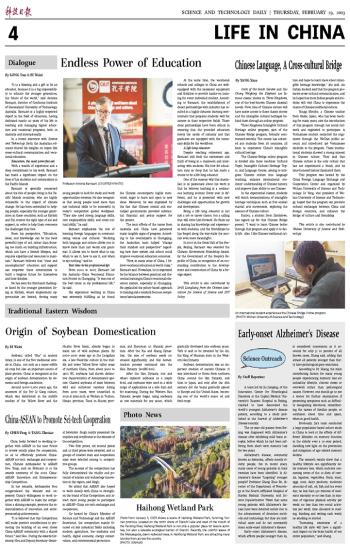
 |
A team led by Jia Jianping, of the Innovation Center for Neurological Disorders at the Capital Medical University's Xuanwu Hospital in Beijing, claimed to have discovered the world's youngest Alzheimer's disease patient, according to a study published in the Journal of Alzheimer's Disease recently.
The 19-year-old patient from Beijing was diagnosed with Alzheimer's disease after exhibiting mild brain atrophy, before which he had been suffering from short-term memory loss for two years.
Alzheimer's disease, commonly known as dementia, affects mostly elderly people, but in recent years, many cases of young patients in their twenties have been identified. Is Alzheimer's disease "targeting" younger people? Professor Zhang Zhuo Bo, director of the Department of Neurology at the Fourth Affiliated Hospital of Harbin Medical University, told Science Popularization Times that some young patients with Alzheimer's disease have been detected earlier due to the advancement of detection methods and technology, but they are individual cases and do not necessarily mean early-onset Alzheimer's disease.
Early-onset Alzheimer's disease, which affects people younger than 65, is considered uncommon as it accounts for only 5-10 percent of all known cases, Zhang said, adding that almost all patients younger than thirty have pathological gene mutations.
According to Dr. Zhang, the main contributing factors for many young people experiencing memory loss are unhealthy lifestyle, chronic stress or overwork rather than pathological causes. However, one should go to see a doctor for further examination if presenting symptoms such as difficulty recognizing directions, remembering the names of familiar people, or confusion about time and space, when in good health.
Previously, Jia's team conducted a large population-based cohort study in China to look at the effects of different lifestyles on memory function in the elderly over a 10-year period, shedding new light on the prevention and mitigation of age-related memory decline.
The research results show that a healthy lifestyle can significantly delay memory loss, which includes consuming seven of the 12 diets of cereals, legumes, vegetables, fruits, meat, eggs, nuts, dairy products, moderate amounts of salt, oil, fish and tea every day; no less than 150 minutes of moderate intensity or no less than 75 minutes of vigorous physical activity per week; no less than two social activities per week; time allocated to reading, thinking and writing each week; no smoking or alcohol.
"Increasing awareness of a healthy life style will have a significant impact on the brain health of our entire population," said Zhang.







